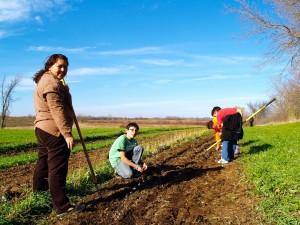The Browning of the American Farm
Back to the Future of Agriculture in the Year 2000
by Devon G. Peña
(Originally posted in July 2000): WHILE THE ANGLO FAMILY FARMER continues to disappear at an alarming rate, the number of Latino farmers has rapidly increased — from 17,476 in  1987 to close to 30,000 in 1997, according to agricultural census data. This number is expected to increase to 40,000 by 2007, and doesn’t include the thousands of uncounted Latino farmers who do not fit the U.S. Department of Agriculture’s conventional definition of commercial farms.
1987 to close to 30,000 in 1997, according to agricultural census data. This number is expected to increase to 40,000 by 2007, and doesn’t include the thousands of uncounted Latino farmers who do not fit the U.S. Department of Agriculture’s conventional definition of commercial farms.
The trend is not limited to the American Southwest, although the states of Texas, California, New Mexico, and Colorado contain more than 80% of Latino-owned and -operated farms. In Washington, which has the sixth-fastest-growing Latino population in the country, the number of Latino farms and orchards increased by a staggering 343% between 1992 and 1997.
The reasons behind this phenomenal growth are many. In Washington, for example, many Anglo families find that their children don’t want to stay on the farm. They also do not want to subdivide their land, so they have turned to the only people who can operate the farms and orchards — their Latino farm laborers.
Still, why are Latino farmers doing so well at a time when Anglo farmers are knuckling under to the weight of low commodity prices? One reason is that Latino farmers are relatively debt-free. From the 1950s through the 1980s, while Anglo farmers were getting into heavy debt to comply with the USDA mantra, “Bigger is Better,†Latino farmers were denied credit. They had to rely on their own extended families for financial support. By the 1990s, when the credit markets started to open for minorities, Latinos were sitting on much debt-free land and water.
Then there are the peculiarities of Latino cultures. The traditions of mutual aid and cooperative labor remain strong in rural Latino communities. Many Latino farms are true family farms, where all members works directly in the production process. This reduces labor costs. In Anglo family farms, much of the labor is hired help.
Crop diversity is another key. Latino farmers avoid monocultures (single crop systems) and prefer polycultures (multiple crop systems). If prices are down for one commodity, they can adapt by emphasizing another crop with higher returns.
The fruits of Latino-owned farms are enjoyed by all Americans. In Colorado, Hispano ranchers deliver high quality beef cattle. Hispano farmers in New Mexico and Colorado produce potatoes and spinach, as well as organic heirloom crops — such as chicos, a white roasting corn, and bolitas, a bean related to the pinto — that command premium prices. In California, Latino farmers are known for their strawberry production, but an increasing number produce crops such as broccoli, carrots, celery, lettuce, and onions. In Washington and Oregon, they grow apples, raspberries, marionberries, and even wine grapes.
NOT ALL LATINO FARMERS are new owners. Many of New Mexico’s Hispano farms have been in the same families for twelve generations. Some farmers trace their ancestry to 1598 and the arrival of the first Spanish and Mexican settlers.
The long years have nurtured strong ties between Hispano farmers and the land. Consider the words of Joseph Gallegos, a fifth generation native of San Luis, Colorado: “For us, farming is not an occupation. It is a way of life. The land is part of the family. It is not something one sells for money.â€
Some Hispanos have returned to ancestral farms after working for decades in urban areas. David Arguello, who farms on 20 acres outside Taos, N.M., received a Ph.D. in social welfare from the University of Washington in 1988. While Arguello still pursues a career as a college professor, farm work remains at the center of his social life and cultural identity.
The USDA, agricultural extension services, land grant colleges, and Natural Resources and Conservation Service have long ignored the needs of Latino farmers. Latinos do not fit the mold of the larger monoculture agribusinesses favored by the agricultural establishment, and racism and cultural insensitivity within these institutions reinforce the neglect.
As the browning of the American farm continues, these institutions must adapt. At stake is nothing less than the nation’s future food supply.
Devon G. Peña, Ph.D., is a lifelong activist in the environmental justice and resilient agriculture movements, and is Professor of American Ethnic Studies, Anthropology, and Environmental Studies at the University of Washington in Seattle. His influential books include Mexican Americans and the Environment: Tierra y Vida (University of Arizona Press, 2005) and the edited volume Chicano Culture, Ecology, Politics: Subversive Kin (University of Arizona Press, 1998). Dr. Peña is the founding editor of the Environmental & Food Justice blog, and is a Contributing Author for New Clear Vision.
This article originally appeared in the July 2000 edition of Colorado Central Magazine, and is reprinted here by permission of the author.
